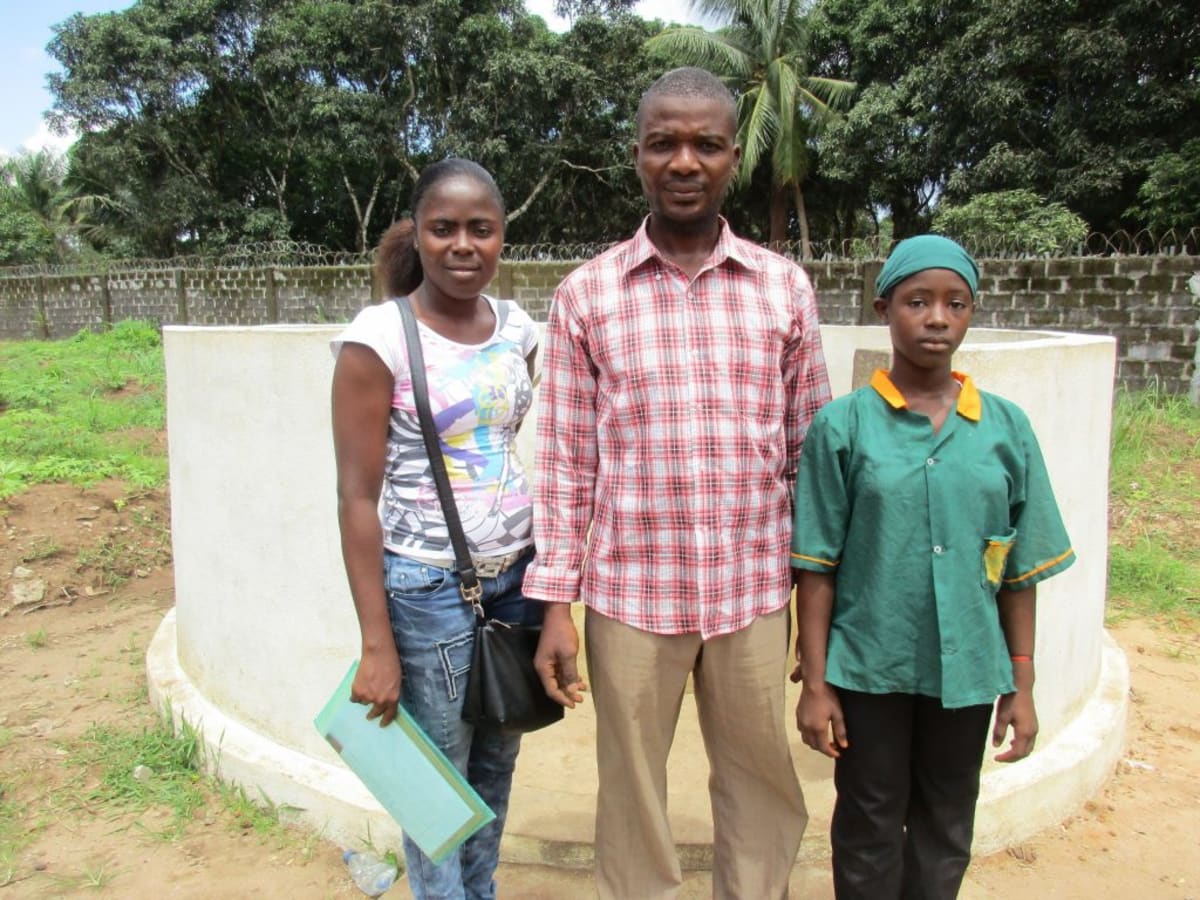Ebola’s Impact
Ebola has been a tragic reality for the people of Sierra Leone over the last two years. Though considered stable at the moment, the country is still very cautious. We still receive periodic reports of people being quarantined due to showing symptoms of Ebola.
Our teams have remained safe and are on the front lines of Ebola prevention through this water, hygiene and sanitation program. Your support acknowledges and celebrates their selfless work and bravery.
The entire team continues to express their gratitude for your support of communities in Sierra Leone, and we can’t wait to celebrate safe water together!
Welcome to the School
Ahmadiya Muslim Primary School has a student population of 254; 129 boys and 125 girls. It employs 11 teachers and two supporting staff.
A normal day begins at 5:30am with a quick bucket bath in preparation for morning prayers. After prayer, teachers like Alie Bangura head off to school to unlock and prepare the classrooms. The students, both from nearby and some from far away, make their way to school for 8am classes. The first break is at 10:10am and lasts ten minutes. During that time, the children line up and use the toilet. Even though new pit latrines were constructed by UNICEF, the water well was not touched. The children that are enrolled in this school come from the Temne and Susu tribes which are predominately Muslim.
The road that leads to the swamp where locals fetch their water is surrounded by beautiful landscape. It is all green, bushes full with fresh tomatoes, onions, cucumbers and cassava leaves just a step away from the water source giving the area a diversity of colors. The animals such as goats, sheep and chickens make their way to the farm everyday with their owners. The goat and sheep herders travel with their animals in order to simultaneously tend their gardens.
Water Situation
Locals take the path to fetch water from the swamp, since it is such a short walk. The water is about two feet deep, where women and children dip their rubber buckets, weaving this way and that to avoid floating debris. The water they gather is separated into different containers once home; one container for domestic chores and the other only for drinking.
There is no doubt that the water people fetch at the swampy river is contaminated. There are women doing their laundry just upstream! The water is also open to contamination from surface runoff, rainwater that mingles with fertilizers and chemicals from the nearby farm. The people are not educated on water treatment they could undertake before drinking.
The known negative consequences of a safe water shortage for this community are immense. The schoolchildren as young as ten years old have skin rashes and bloated stomachs. The high rate of school absenteeism is due to runny stomachs, typhoid, dysentery and cholera.
Sanitation Situation
The school has a total of six pit latrines that are in great condition since they are new. There are also three hand-washing stations with soap located outside of the classrooms.
The garbage is thrown behind the school building and burnt. During hygiene and sanitation training, we will share about how to dig a proper pit with a fence around it, and how to maintain it properly so that is more hygienic.
The current health situation in the community is fairly good. What they lack in safe drinking water they make up for with a clean environment, proper hygiene and good toilet facilities. Although they do not have safe drinking water, they take the necessary precautions to reduce sickness within their community.
Plans: Hygiene and Sanitation Training
Teachers will be trained for three days, three hours a day. The facilitator will use the PHAST (Participatory Hygiene and Sanitation Training) method to teach topics pertinent to this school and their surrounding community, such as but not limited to hand-washing and practicing other healthy personal hygiene habits such as teeth-brushing.
11 hand-washing stations will be constructed by the teachers during training, and they will pass this knowledge on to their students.
Plans: Well Rehabilitation
The hand-dug well on school grounds was installed in 2012 by the Africa Muslim Agency. The well is not deep, but the casings are in great condition. The pump on the well stopped working last year, and then the well dried up.
The well needs to be cleared and deepened to a total depth that will provide a static level of between five and seven feet of water. Four cassions will be made with cement, iron rods and granite stones. The pipes and pump will have to be replaced. The existing fence is crumbling and will have to be improved. A new well pad has to be made. We see this type of cement deterioration a lot; other organizations do not use the right amount of cement and sand in their mix, so the projects do not last.
This rehabilitation will give the school a safe and reliable source of drinking water, and the project will be monitored to ensure it stays that way!

 Protected Dug Well
Protected Dug Well




















